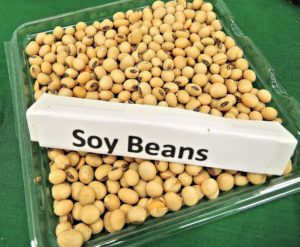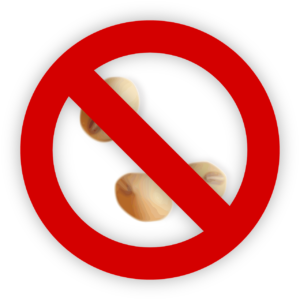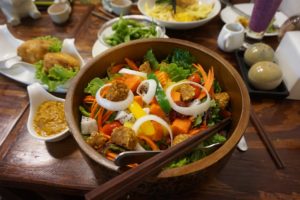Vegetarian and Vegan Diets:
What you need to know about Soy in your diet
If you avoid foods with a face, you may end up consuming a lot of soy to meet your protein needs. While not all soy is bad, the type that most Americans eat is not the healthy type of soy and it may be doing more harm than good for your body.
What Type of Soy to Avoid/Minimize in your Diet
- Processed soy products such as soy burgers and hot dogs
- Soy protein powder
- Soy infant formula (if you can)
- Soybean oil (use avocado, EVOO, coconut)
- Soy cheese (use grass fed, raw cheese , goat cheese or avoid)
- Soy nuts (eat tree nuts if you can tolerate)
- Soy milk (drink nut milks, coconut milk)
- Tofu (most of it is GMO and many lack the enzyme to digest this unfermented soy food) (6 )
- Soy nut butter (try nut butters or sunflower butter)
- soy sauce (use coconut aminos instead)
Much of the soy that is consumed in the U.S. comes from packaged and processed soy products. You may be even consuming more soy than you realize since soy is cheap and has been added to many processed packaged foods. (3)
Soy is used as an oil, as a thickener, flavor enhancer, stabilizer, preservative and a filler. (4) If you are eating processed foods, the odds are you are eating processed soy.
School lunch programs even add soy to their hamburger patties. Studies show that soy may not be good for a growing and developing child. (5). Have your child bring a lunch from home instead.
What You Need to Know About Soy
The forms I mentioned above are unhealthy for various reasons, such as;
- Soy is high in oxalates. (2) While there are other foods that are high in oxalates as well, many vegans/vegetarians consume soy daily and multiple times per day. A buildup of oxalates can interfere with the body’s metabolic processes and can contribute to autism, ADD, COPD, asthma, cystic Fibrosis, vulvodynia, AI disease and low thyroid. (1)
- Soy is a GMO crop. This means that the crop has been engineered to withstand spraying of roundup on the crop. When you consume processed soy products you are consuming GMO’s. (Roundup-also called glyphosate-can lead to leaky gut syndrome, and can disrupt the endocrine system.) (1)
- Aluminum and arsenic have also been found in GMO soy. (1)
- Soybean oil is high in omega 6’s. While we need omega 6 fatty acids, we consume too many which leads to inflammation in the body. (7)
- Soy contains isoflavones that function as endocrine disruptors. These isoflavones which are plant compounds can activate estrogen receptors in the body. (7)
- Soy isoflavones can also cause breast cancer. Studies are conflicting on the pros and cons for breast health. (3)
- Soy can impair thyroid function. The isoflavones found in soy can function as goitrogens which are substances that can interfere with thyroid function. (3).
- Soy formula for babies is low in fat and babies need fat. Soy formula is also too high in manganese and this can lead to ADHD symptoms. It is also high in aluminum. (1) Think about it, you are also giving your baby a high amount of genistein (an isoflavone) which can impact your child’s hormones down the road. (5)
- The phytoestrogens can also contribute to andropause in men (7)
- Because of the excess estrogen from a diet filled with processed soy, it can contribute to estrogen dominance in women and PMS symptoms along with breast cancer, PCOS, cervical cancer and other hormone imbalance disorders such as girls reaching their menstruation as an early age. (4) . These hormone properties are from genistein which is the main isoflavone found in soy. (5)
- Introducing compounds that mimic estrogen could upset the body balance and may lead to long term impact on behavior and brain chemistry. (5)
- Soy products can cause vitamin B12 deficiency. Soy contains B12 analogs. These analogs block the uptake of true B12 so your needs actually increase. But these B12 analogs cannot be used by your body the way it would use real B12. (6)
What Type of Soy Can You Eat?
Types of Soy to add to your diet
- Fermented soy is a great choice. But even so, this should not be the bulk of your diet. Even fermented soy will contain isoflavones: add in tempeh, miso and natto. Even fermented soy can be GMO so be sure to check the label and purchase organic (4). Fermented foods contain probiotics which a healthy gut needs.
- Soybeans in whole form are rich in micronutrients and can be a good source of plant protein but don’t go overboard and make this your main protein source since soybeans are high in omega 6 essential fatty acids which can lead to inflammation if over consumed.
Bottom Line
You can still enjoy your soy-You don’t need to completely remove your favorite foods with soy in them (unless you have an allergy or food sensitivity to soy) but you should reduce the amount in your diet based on the reasons above and replace them with other healthy vegetarian food options.
Opt for fermented non-GMO soy but still don’t go overboard and make it a small portion of your diet. If you want to add in fermented foods, rotate your fermented soy with other options such as fermented vegetables, kimchi and fermented goat milk kefir or coconut kefir. In the end, fermented soy has its benefits and processed soy does not. Choose wisely.
If you are a vegetarian or vegan who eats a lot of soy and are confused about what to eat if you take soy out of your diet, give me a call and I can help you find the right options for you!
Resources
- https://people.csail.mit.edu/seneff/glyphosate/Seneff/Yale2015.pptx
- https://www.ncbi.nlm.nih.gov/pubmed/15998131
- https://authoritynutrition.com/is-soy-bad-for-you-or-good/
- http://www.globalhealingcenter.com/natural-health/5-ways-to-soy-upsets-hormone-balance/
- https://www.scientificamerican.com/article/soybean-fertility-hormone-isoflavones-genestein/
- http://articles.mercola.com/sites/articles/archive/2012/02/15/how-to-avoid-the-most-dangerous-side-effect-of-veganism.aspx
- Bauman, E. & Friedlander, J. (2014) Foundations in Nutrition. CA: Bauman College
If you are sick and tired of feeling sick, tired, fatigued, depressed, anxious and more and have given up hope then Karen’s simple, effective, individualized and sustainable approach may be what you need.
Karen Brennan, MSW, CNC, Board Certified in Holistic Nutrition and Herbalist is the author of Tru Foods Depression Free Nutrition Guide; How Food Supplements and herbs can be used to lift your mood and owner of Tru Foods Nutrition Services, LLC.
For more information visit www.trufoodsnutrition.com
Get her Food Swap Guide here to get started on your health journey today! Want more information, like her fb page here
As a nutrition professional, Karen does not treat, cure nor diagnose. This information is for educational purposes only.




Leave A Comment
You must be logged in to post a comment.